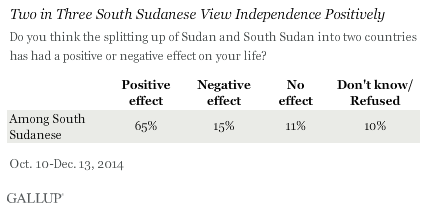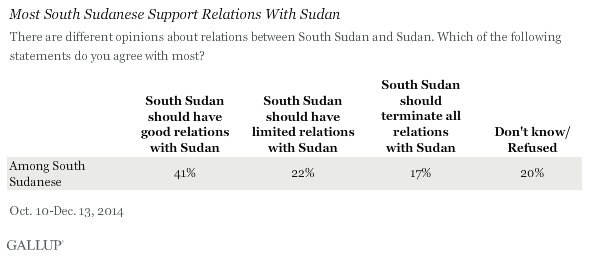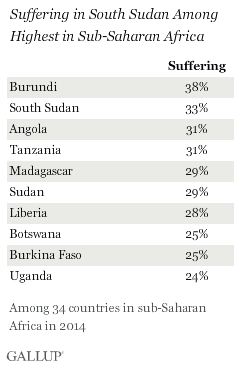Story Highlights
- Despite struggles, residents favorable toward independence
- Four in 10 want good relations with Sudan
- South Sudanese among most likely in Africa to be suffering
WASHINGTON, D.C. -- South Sudan marks the fourth anniversary of its independence Thursday against the backdrop of an ongoing civil war and the threat of famine. Despite the young country's rocky start, few South Sudanese surveyed in 2014 appear to regret the decision to break away from the Khartoum-based Sudanese government in 2011. Residents are considerably more likely to say that the splitting of Sudan and South Sudan has affected their lives positively than negatively (65% vs. 15%, respectively).

Because of the country's civil conflict, South Sudan remains a dangerous place to conduct surveys, resulting in the exclusion of parts of all 10 states from Gallup's study. Overall, this survey is representative of 58% of the South Sudanese population.
South Sudanese independence, the culmination of decades of brutal armed struggle against central government forces, had the full support of the South Sudanese people. In 2011, 99% in South Sudan voted for independence in a nationwide referendum, which is higher than the 86% of residents surveyed who now tell Gallup they favored independence at that time.
Reflecting the difficult history with their northern neighbor, South Sudanese are split on the future of relations. Four in 10 South Sudanese surveyed (41%) say South Sudan should have good relations with Sudan. Another 22% say that their government should have limited relations with Khartoum, while 17% favor terminating relations with Sudan altogether.

Little more than two years after splitting with Sudan, South Sudan returned to large-scale violence in late 2013 after President Salva Kiir accused Vice President Riek Machar of plotting a coup against his government, an accusation Machar denies. The ensuing violence and instability in the past 18 months reportedly has displaced more than 2 million people, and starvation threatens hundreds of thousands because farmers cannot plant needed crops.
Suffering in South Sudan Among Highest Levels in Sub-Saharan Africa
While many residents say the separation from Sudan has affected their lives positively, South Sudanese still rate their lives as poorly as any population in sub-Saharan Africa. One in three South Sudanese rate their lives poorly enough to be considered "suffering."

Gallup classifies respondents as "thriving," "struggling" or "suffering" according to how they rate their current and future lives on a ladder scale with steps numbered from zero to 10 based on the Cantril Self-Anchoring Striving Scale. Gallup considers people to be suffering if they rate their current lives a 4 or lower and predict that their lives in five years will be a 4 or lower. Respondents do not label themselves as suffering.
Implications
The fourth anniversary of South Sudan's independence is more somber than celebratory as the world's newest country faces a grave humanitarian crisis. The ability of the country's leadership to end the conflict, facilitate aid and begin to build basic services and infrastructure will determine whether South Sudan can improve the lives of its suffering people. A future article will further discuss South Sudanese' perceptions of the country's prospects for peace, the state of the nation's infrastructure and the top priorities of South Sudan's population.
The life evaluation data in this article are available in Gallup Analytics.
Survey Methods
Results are based on 1,000 face-to-face interviews with adults, aged 15 and older, Oct. 10-Dec. 13, 2014, in South Sudan. Parts of all 10 states of South Sudan were excluded. Within Jonglei state, only the capital city of Bor was included. The excluded areas represent 42% of the South Sudanese population. For results based on the total sample of national adults, one can say with 95% confidence that the margin of sampling error is ±3.8 percentage points. The margin of error reflects the influence of data weighting. In addition to sampling error, question wording and practical difficulties in conducting surveys can introduce error or bias into the findings of public opinion polls.
Learn more about how the Gallup World Poll works.

